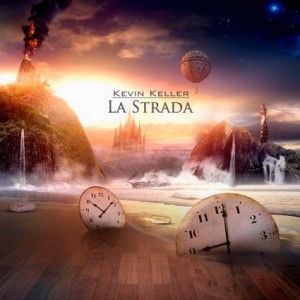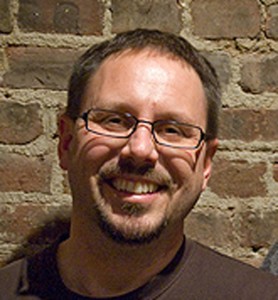Kevin Keller created some of the first works I ever referred to as “Ambient Chamber Music.” That intersection of styles was the perfect place for a young composer to be, especially one who started out studying classical music and even had a student piece performed by the Kronos Quartet.  But then he started playing progressive rock guitar and listening to German space music by Tangerine Dream and Klaus Schulze, which sent him into the world of synthesizers. His early albums, like The Mask of Memory and Intermezzo were mostly electronic affairs, with acoustic piano and occasional strings. But beginning with Pendulum, his classical roots reasserted themselves and he began focusing more on composing for strings.
But then he started playing progressive rock guitar and listening to German space music by Tangerine Dream and Klaus Schulze, which sent him into the world of synthesizers. His early albums, like The Mask of Memory and Intermezzo were mostly electronic affairs, with acoustic piano and occasional strings. But beginning with Pendulum, his classical roots reasserted themselves and he began focusing more on composing for strings.
On Pendulum, Keller combined electronics with classical instruments like piano and cello, to create atmospherically elegant works. Over the years, he’s gotten more acoustic, but on La Strada he brings the electronics more to the fore, treating them as another voice in the orchestra. It is his most ambitious and assured work to date.
The album establishe itself with a kind of prelude. “At the Start” fades in with a vaguely ocean-like background ambience, elusive electronic sustains and a plaintive piano melody before tapping into an electronic groove and quietly heroic strings. That rhythm segues into the pizzacato strings and syncopated electronic groove on “Tunnel of Light” which has just enough glitches to keep the rhythm interesting, without getting in the way of Keller’s propulsive acoustic piano and surging strings. It moves through time-stepping acoustic piano, counting out the minutes in a tense scene that could be out of an Italian thriller.
Tunnel of Light
That cinematic reference isn’t just the usual critic’s shorthand. The album title comes from a Fellini film and much of it is essentially Keller re-scoring scenes from movies like Blade Runner, 2001: A Space Odyssey and The Tree of Life. He’s selected films by directors who are particularly attuned to matching visuals and music, such as Ridley Scott, Stanley Kubrick, and Terrence Malick. Remarkably, although the influences of Vangelis, Clint Mansell and Hans Zimmer is there, it doesn’t sound like any of their scores, but is a complete reimagining.
The title track, “La Strada” is a poignant song dominated by Keller’s piano with sustained accents from electric guitarist David Helpling. It’s a song of wistful memories and lost dreams, played out over a subtle electronic heartbeat.
 Keller has used string sections in the past, most notably on In Absensia, where he used a handful of players to multi-track orchestral parts. But for La Strada, he brought in 13 string players from the Salomé Chamber Orchestra.
Keller has used string sections in the past, most notably on In Absensia, where he used a handful of players to multi-track orchestral parts. But for La Strada, he brought in 13 string players from the Salomé Chamber Orchestra.
Keller has made the move from using electronics to mimic acoustic instruments, to using electronics for their own virtues, letting the strings be the strings. It’s a realization he came to years ago when he didn’t think he’d ever have an orchestra to play his music and was concentrating on synthesizers. “If I’m going to be writing music that’s not going to be played by regular instruments,” he said, “then I should write it in a very nontraditional way,” But now that he has the strings, he’s completely shifted the paradigm.
Keller’s music is far from all swooning strings and lyrical piano. “Lightning Road” is an energized chase with a percolating groove that spins gravel out from under the strings and Keller’s propulsive piano. “Moments in Time,” with a surprising vocoder vocal accent, is a military march.
Beyond the Infinite
The centerpiece of the album is the 9 minute “Beyond the Infinite.” Built around an ostinato piano riff, Keller builds it up, layering a piano counterpoint, bringing in electronic trip-hop percussion, and setting strings that surge with ominous portent. Musique concrete sounds wash through the stereo spectrum until Keller drops everything out for a bass pulse, dark synth pads and a horror film gothic choir. Was he watching the Stargate scene of 2001: A Space Odyssey when he composed it? It has that same sense of uncontrolled hurtling through the cosmos.
You can hear many of Keller’s influences, including Roger Eno’s original ambient chamber works, Philip Glass (on “New Beginnings”) Hans Zimmer and Vangelis. And comparisons to Italian composer Ludovico Einaudi would not be inaccurate. The energy of this album is a welcome turn after several recordings of more serene, stately works. Produced by Russel Walder of the Ira Stein & Russel Walder duo that recorded for Windham Hill and Narada Records in the 80s and 90s, this album has the visceral energy of highway chase, the sweep of rolling horizons and the emotion of discovery.
Moments Lost In Time
On his crowdfunding campaign for the album, Keller stated that he wanted this to be his entré into the world of film composing. He should have been there a while ago, but if he does make it, I hope he doesn’t lose the original voice he’s honed over the last two decades. La Strada is the album that may finally take Kevin Keller out of the New Age bog and into the world.
-John Diliberto
